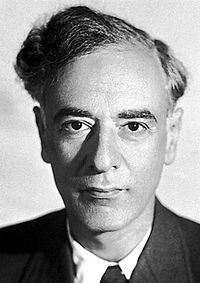Lev Landau Scientist
Lev Davidovich Landau (Russian: Ле́в Дави́дович Ланда́у; IPA: [lʲɛv dɐˈvidəvʲitɕ lɐnˈdaʊ] (13px ); January 22 [O.S. January 9] 1908 – April 1, 1968) was a prominent Soviet physicist who made fundamental contributions to many areas of theoretical physics. His accomplishments include the independent co-discovery of the density matrix method in quantum mechanics (alongside John von Neumann), the quantum mechanical theory of diamagnetism, the theory of superfluidity, the theory of second-order phase transitions, the Ginzburg–Landau theory of superconductivity, the theory of Fermi liquid, the explanation of Landau damping in plasma physics, the Landau pole in quantum electrodynamics, the two-component theory of neutrinos, and Landau's equations for S matrix singularities. He received the 1962 Nobel Prize in Physics for his development of a mathematical theory of superfluidity that accounts for the properties of liquid helium II at a temperature below 2.17 K (−270.98 °C).
Search
Scientist
| awards | |
|---|---|
| doctoral student | |
| Field of study | |
| notable student |
Lev Landau on Wikipedia
External resources
- http://academic.evergreen.edu/z/zita/articles/History/landau.pdf
- http://arxiv.org/abs/hep-ph/0204295v1
- http://lib.ru/MEMUARY/LANDAU/landau.txt
- http://www.ejtp.info/landau.html
- http://www.en.globaltalentnews.com/current_news/reports/3609/As-a-student-Landau-dared-to-correct-Einstein-in-a-lecture.html
- http://www.nobel-winners.com/Physics/lev_davidovich_landau.html
- http://www.worldscientific.com/worldscibooks/10.1142/8641
- https://archive.org/download/QuantumMechanics_104/LandauLifshitz-QuantumMechanics_text.pdf
- https://www.novapublishers.com/catalog/product_info.php?products_id=9382
